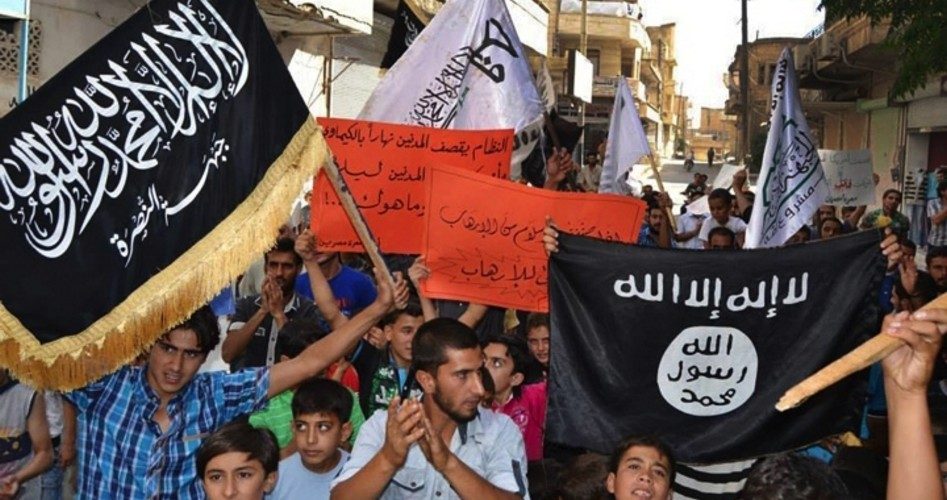
The coalition formed to fight Islamic State terrorists has already become fractious, as the “moderate” Syrian rebels the United States is backing don’t appreciate the bombing of their extremist friends.
The rebels of the Free Syrian Army, who have been fighting the government forces of Bashar al-Assad in the three-and-a-half-year-old Syrian civil war, have expressed anger at U.S. airstrikes against the al-Qaeda-linked al-Nusra and Khorasan forces that are also fighting for the overthrow of the Assad regime. The United States informed the Syrian government of the impending airstrikes Monday, the official Syrian news agency announced, but no one notified the rebel commanders. The report of the U.S.-led bombing was in neutral terms, without even mentioning breaches of Syrian sovereignty, the McClatchy news service reported. That and the choice of targets have caused some leaders of the Free Syrian Army to conclude the United States has abandoned their effort to topple Assad in order to win the government’s support for the war against the Islamic State.
The Assad regime “is the head of terrorism,” Col. Hassan Hamadi told McClatchy. “If there is a comprehensive solution which targets the regime and the jihadi groups together, then all the Syrian people will stand by us, and they will be with the bombing,” said Hamadi, a defector from the Syrian army who now leads a legion of about 6,400 rebels. If the U.S.-led war against terrorists does not also target the government in Damascus, “it’s lacking something important,” he said.
Nusra Front and allied forces announced they have evacuated bases in the populated Idlib region in Northwest Syria following the U.S.-led aerial attacks, Reuters reported. Rebel forces fear that will create an opening for Assad’s army to retake lost ground. There are also contradictory reports about the targets struck and the fatalities inflicted in eight attacks on Nusra Front installations. U.S. officials said the strikes were aimed at Khorasan, a Nusra unit that includes senior al-Qaeda figures allegedly plotting an attack on Western targets. But one of the missiles destroyed temporary housing for displaced civilians, causing the death of 10 people, McClatchy reported, citing conflicting accounts among “activists” in the area, with one source claiming the strike killed 10 Nusra “emirs,” while another said there were no Nusra leaders in the building.
“People see there was a massacre in which innocent people were killed,” Hamadi said. “They are asking, ‘Who is responsible, the [U.S.-led] coalition or the Assad regime?'”
“Nusra is still popular in Syria,” Hamadi said. “And now Nusra is playing on the emotions of the Syrian people.” Its leaders are saying those who deal with the West become part of the West, he said. “They are accusing us of being traitors. And the majority of the Syrian people are speaking in the same tone.”
The dual nature of the fighting in Syria has also divided the nations in the region, caught in a conflict between opposition to the Islamic State and its affiliated organizations and support for the Assad regime. The United States has been encouraging Russia to join the anti-terrorist campaign, even as the United States and the European Union have been ramping up economic sanctions against Moscow for its support of pro-Russian rebels fighting the government in Ukraine. The United States and Western allies have also been imposing sanctions for years against Iran, which, like Russia, opposes the Islamic State, but backs the Assad regime in Syria. The United States has been calling for Assad’s ouster, but has refrained from becoming directly engaged in Syria’s civil war, officially supplying non-lethal military equipment to the rebels, while funneling lethal weapons though nations such as Saudi Arabia and Qatar, both of which are actively supporting the Syrian rebels. The recent decision to arm “moderate” rebels for the fight against the Islamic State has increased pressure for Washington to join the fight against Assad as well.
“We need to create an army to fight the terrorists, but we also have to fight the regime,” Sheikh Tamim bin Hamad al-Thani, emir of Qatar, told the New York Times Thursday. “We have to do both.”
But a Syrian diplomat, the Times reported, boasted to a pro-government newspaper that “the U.S. military leadership is now fighting in the same trenches with the Syrian generals, in a war on terrorism inside Syria.” And Haider al-Abadi, the new Iraqi prime minister, said he had delivered a message to Assad on behalf of Washington that the Syrian government is not the target of American-led airstrikes.
That seems likely to further anger the so-called moderate Syrian rebels and diminish their support for the fight against the Islamic State. Conventional wisdom has it that the enemy of one’s enemy is his friend. But that may not be working for the U.S. policy of arming some insurgents in Syria while bombing others. It might succeed only in multiplying the number of America’s enemies.
Photo of al-Nusra Front and ISIS supporters protesting U.S. airstrikes in Syria: AP Images


